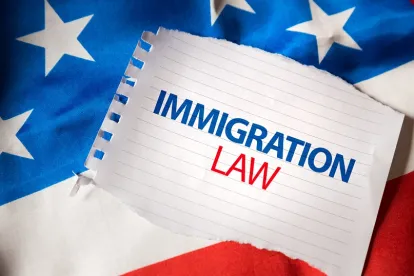On June 26, 2017, the US Supreme Court granted certiorari and consolidated two cases, Trump v. IRAP and Trump v. Hawaii, recently litigated in the US Court of Appeals enjoining the President’s second Executive Order entitled Protecting the Nation from Foreign Terrorist Entry Into the United States (EO2). While this grant of certiorari is a procedural decision to take up the case in the next session, beginning in October 2017, the order also permits partial implementation of the EO2 travel ban. Implementation by US government agencies, as explained below, commenced at 8 p.m. on June 29, 2017.
The Per Curiam (unanimous) decision lifts portions of the injunctions issued by the lower courts and upheld by the Fourth and Ninth Circuit Court of Appeals, but also inserts a new exception for those otherwise affected by EO2. As described in our previous post, EO2 implements a travel ban for citizens of Iran, Libya, Somalia, Sudan, Syria and Yemen from entering the United States for 90 days [Section 2(c)], suspends entries and adjudication of refugee applications for 120 days [Section 6(a)] and imposes a 50,000 annual refugee cap [Section 6(b)].
The Supreme Court’s decision only permits a partial reinstatement of the travel ban. The Court held that the EO “may not be enforced against foreign nationals who have a credible claim of a bona fide relationship with a person or entity in the United States.” Per the Court’s decision, the following categories of travelers may still be eligible for visas and entry into the United States:
- Travelers who can demonstrate a close familial relationship to a person in the United States. These individuals should still be eligible to travel with a valid tourist visa (B-2).
- Travelers who can establish a formal, documented relationship to an entity in the United States, including students who have been admitted to United States universities (F-1), vocational (M) and training programs (J) as well as workers who have been offered and accepted employment by a company in the United States. Such workers should still be eligible to enter the US with valid visas for business (B-1) and for issuance of nonimmigrant visas like the H-1B, L-1, E, O, P and others.
It should be noted the EO2 travel ban explicitly excludes the following individuals:
- Green card holders (lawful permanent residents), no matter their nationality;
- Dual Nationals of the six designated countries who are traveling on the passport of a non-designated country.
- Nationals of the six designated countries who held valid US visas on or before June 29, 2017.
- Individuals already granted asylum or refugee status within the US.
- Anyone with a document other than a visa valid on June 29, 2017 (such as an advance parole document) that permits him/her to travel to the United States and seek entry or admission.
- Anyone traveling on diplomatic visas, North Atlantic Treaty Organization visas, C-2 visas for travel to the United Nations, and G-1, G-2, G-3 and G-4 visas.
Case-by-case waivers are also established by EO2 for individuals who can prove that (1) denying entry would cause undue hardship; (2) they are not a national security threat; (3) entry would be in the national interest.
Implementation
Various agencies, including the Department of State (DOS) and the Department of Homeland Security (DHS) have recently issue preliminary statements as to how the above will be implemented. We summarize some points below:
- Visa appointments will still be scheduled for applicants of the six designated nationalities, but visas will not be issued without evidence of a bona fide relationship or qualification under one of EO2s exemptions or waivers.
- No visas will be revoked based on EO2.
- The EO2 travel ban does not apply to
- Those inside the US on June 26, 2017;
- Those who have a valid visa on June 29, 2017; or
- Those who had a valid visa at 8 p.m. EDT on January 29, 2017 (even if that visa expires or the person leaves the US).
- Most visa applicants will be deemed to have a qualifying relationship based solely on the types of visas for which they qualify since employment visas, educational visas, training visas, and family-based immigrant visas all normally have a documented US counterpart individual or entity. However, visas in some categories, including the following, will require deeper review: B (business and tourist visitors), C-1 (transit), D (crewmembers), I (media) and K (fiancées).
- The new requirements will not automatically end after 90 days, but new guidance will be issued prior to that time regarding an end date.
- “Close family” includes a parent (including parent-in-law), spouse, child, adult son or daughter, son-in-law, daughter-in-law, sibling (whole and half) including step relationships.
- “Close family” does not include grandparents, grandchildren, aunts, uncles, nieces, nephews, cousins, brothers-laws and sisters-in-law, fiancés and any other “extended” family members.
- A US entity relationship must be formal, documented, and formed in the ordinary course (not just to evade EO2). Examples of qualifying relationships include:
- A media member applying for an I visa whose company has a US new office.
- Students admitted to US schools.
- Workers with accepted offers of US employment.
- Lecturers invited to speak in the US.
- Tourism alone, even with travel and hotel reservations, is not sufficient.
- Refugees are not exempt simply due to their relationship with a US refugee resettlement agency and will likely need to provide additional proof of a qualifying relationship with a US individual or agency. This point is heavily disputed by refugee agencies and will likely be adjudicated in courts.
- Refugees scheduled to travel through July 6, 2017 are exempt from EO2.
We are monitoring the issuance of further guidance by the various agencies and how they will enforce this partial travel ban. However, any individuals that believe they may be impacted, should consult with immigration counsel before applying for visa, traveling to the United States or departing the United States, if currently present.





 />i
/>i

